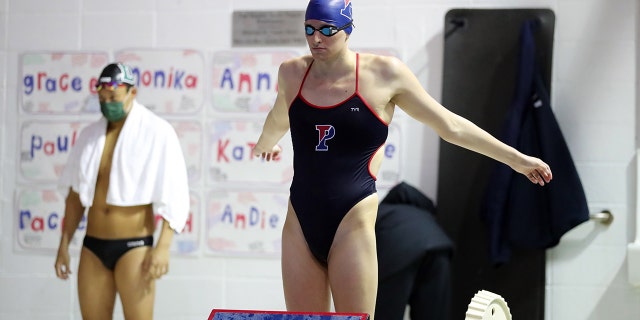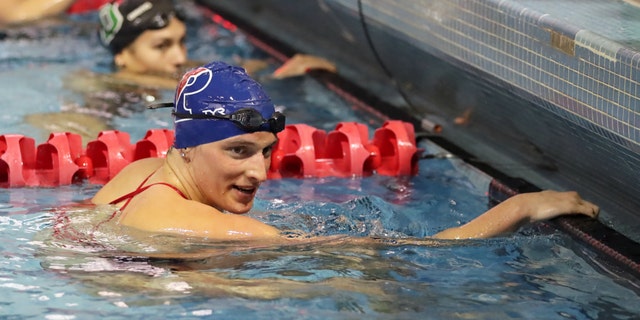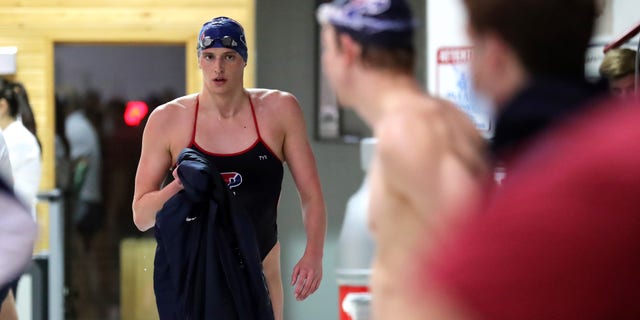UPenn swimmer speaks out against school’s handling of Lia Thomas saga
Fox News contributor Tammy Bruce discusses the fight for fairness in women’s sports
Lia Thomas’ swimming future still remains unclear as USA Swimming released its Athlete Inclusion, Competitive Equality and Eligibility Policy on Tuesday, while her teammates released a joint statement backing their fellow competitor.
The new policy was published in USA Swimming’s operating policy manual on its website, and the organization later issued a press release on the issue. The new guidelines come as the transgender swimmer’s prominence in the pool has come under fire and a debate rages over how fair it is for her to be swimming against other biological females.
“While recognizing the need for the aforementioned guidelines in elite competition, sport is an important vehicle for positive physical and mental health, and, for this reason, USA Swimming remains steadfast in its continued commitment to greater inclusivity at the non-elite levels,” the organization said.
Lia Thomas of the Pennsylvania Quakers gets ready to compete in a freestyle event during a tri-meet against the Yale Bulldogs and the Dartmouth Big Green at Sheerr Pool on the campus of the University of Pennsylvania on Jan. 8, 2022 in Philadelphia, Pennsylvania.
(Hunter Martin/Getty Images)
USA Swimming said a decision-making panel of three independent medical experts would implement the elite athlete policy. There will be two areas of criteria they will be looking for eligibility:
“Evidence that the prior physical development of the athlete as a male, as mitigated by any medical intervention, does not give the athlete a competitive advantage over the athlete’s cisgender female competitors.
“Evidence that the concentration of testosterone in the athlete’s serum has been less than 5 nmol/L (as measured by liquid chromatography coupled with mass spectrometry) continuously for a period of at least thirty-six (36) months before the date of application.
“Athletes will need to abide by USA Swimming’s Athlete Inclusion, Competitive Equity and Eligibility Policy to be eligible to set USA Swimming National Age-Group Records in the 13-14 age group and above or to be eligible to set an American Record, per the USA Swimming Rules & Regulations, in a competition category which is different than the gender assigned to the athlete at birth.”
USA Swimming made an important note at the bottom of the release, saying “USA Swimming’s policy is not applicable to non-USA Swimming athlete members nor non-approved Elite events, as defined in the policy.”
USA Swimming defines Elite Athletes as “any athlete who has achieved a USA Swimming Junior National time standard and desires to participate in any of the following ‘Elite Events:’ … Any United States Olympic and Paralympic Committee (“USOPC”) Delegation Event and/or Protected Competition as 42 defined in the USOPC Bylaws; Fédération Internationale de Natation (“FINA”) Events; PanPacific Championships; World University Games; USA Swimming Nationals, Junior Nationals, U.S. Open, International Team Trials, U.S. Olympic Team Trials – Swimming; and/or any other competition designated by USA Swimming as an ‘Elite Event’ and any other event which conditions entry on meeting the USA Swimming Junior National Time Standard or faster. For purposes of this Policy, Elite Events shall also include any other competition in which a qualifying time standard is achieved for entry into the other Elite Events described above or to be eligible to set an American or National Age-Group Record at the 13-14 level or above.”
Lia Thomas of the Pennsylvania Quakers smiles after winning the 200 meter freestyle event during a tri-meet against the Yale Bulldogs and the Dartmouth Big Green at Sheerr Pool on the campus of the University of Pennsylvania on January 8, 2022 in Philadelphia, Pennsylvania.
(Hunter Martin/Getty Images)
According to SwimSwam, USA Swimming CEO Tim Hinchey said in December Thomas wasn’t a member of USA Swimming.
The NCAA updated its transgender participation policy last month, saying it will be determined on a sport-by-sport basis. If there is no national governing body for the sport, then the NCAA sport will follow the International Olympic Committee’s (IOC) policy.
The updated policy for the NCAA says that by March “transgender student-athletes will need to document sport-specific testosterone levels beginning four weeks before their sport’s championship selections. Starting with the 2022-23 academic year, transgender student-athletes will need documented levels at the beginning of their season and a second documentation six months after the first. They will also need documented testosterone levels four weeks before championship selections. Full implementation would begin with the 2023-24 academic year.”
It’s unclear whether USA Swimming’s Elite Athlete policy will also be the governing basis for all collegiate athletes moving forward. The NCAA’s policy was set to go into effect in March, ahead of the winter championships.
USA Swimming, the NCAA and Penn Athletics didn’t immediately respond to Fox News’ request for comment.
Independent Women’s Law Center (IWLC) and Independent Women’s Forum (IWF) condemned USA Swimming’s policies.
“USA Swimming’s insistence that there is some way to eliminate the athletic advantage that post-pubescent males have over females denies science. But it also ignores the fact that this is not only about fair competition – it is also about equal opportunity to compete at all,” IWLC director Jennifer C. Braceras said in a statement.
Lia Thomas of the Pennsylvania Quakers after winning the 500 meter freestyle event during a tri-meet against the Yale Bulldogs and the Dartmouth Big Green at Sheerr Pool on the campus of the University of Pennsylvania on Jan. 8, 2022 in Philadelphia, Pennsylvania.
(Hunter Martin/Getty Images)
“In competitive sport, not everybody makes the team or gets a scholarship. And not all of those who make the team get to compete. Allowing male-bodied athletes to compete on limited roster teams inevitably means that there are fewer opportunities for female athletes (to be recruited, to receive a scholarship, or to participate in competitions).
“Make no mistake, taking athletic opportunities away from female athletes violates Title IX.”
Earlier Tuesday, Thomas’ teammates released a joint statement in support of the transgender swimmer.
“We want to express our full support for Lia in her transition. We value her as a person, teammate, and friend. The sentiments put forward by an anonymous member of our team are not representative of the feelings, values, and opinions of the entire Penn team, composed of 39 women with diverse backgrounds,” the statement read, via ESPN.
“We recognize this is a matter of great controversy and are doing our best to navigate it while still focusing on doing our best in the pool and classroom.”
Source: Read Full Article











